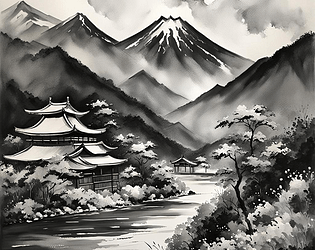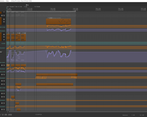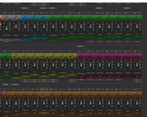Great structure and flow, it's really impressive how everything comes together in this piece. It's super difficult to get that Gagaku minimalist style to work well, and I think you pulled it off very convincingly! The only thing for me is I think some of your phrases could be shaped a bit more, with more crescendos and diminuendos in their playing. For example, the end of the phrase at 0:31 and the start of the phrase at 0:35 felt a bit unnatural, and doesn't do justice to the beautiful music you've created. Even if you're going for a sudden, jarring entrance for the strings, I think a very subtle swell and fall at the beginning and ending of your phrases using a fader or something would make the music sound so much better. I do notice you do phrase your instruments in other sections, and it would be great if that kind of detail could be applied throughout all of this beautiful piece. Great job, I really enjoyed this!
Play soundtrack
Ku Ga Ga's itch.io pageResults
| Criteria | Rank | Score* | Raw Score |
| Composition | #4 | 3.800 | 3.800 |
| Overall | #5 | 3.900 | 3.900 |
| Challenge | #6 | 4.400 | 4.400 |
| Creativity | #7 | 3.900 | 3.900 |
| Mixing | #7 | 3.500 | 3.500 |
Ranked from 10 ratings. Score is adjusted from raw score by the median number of ratings per game in the jam.
Title
Ku Ga Ga
Description
For this challange I wanted to focus on the "exotic" part. I took this challenge as a chance to make something inspired by Gagaku, the old traditional court music played in ancient Japan.
For the melodic aspect I used the scale ryo. This scale has a pentatonic core of C D E G A but F# and B can be also be present. In the middle section it did end up sounding more natural minor though to what notes I ended up using. The harmony is based on the chords from the instrument shō. As I wanted the piece to be a bit more exotic I used a kinda nonstandard form. The percussion is made by a few ryhtmic cycles that all synchronise at the first beat after 8 meassures, resulting in some kind of semi obachi. Though not japanese, I used the chinese instrument xiao and erhu to get even more of an exotic flavor.
Plugins used
Mostly EastWest for midi. Some others for mastering/mixing
Link(s) to your submission
https://soundcloud.com/per-loennqvist/ku-ga-ga?si=5bd63f0782d949938604d187209749...
https://youtu.be/coS-voP8qNY






Leave a comment
Log in with itch.io to leave a comment.